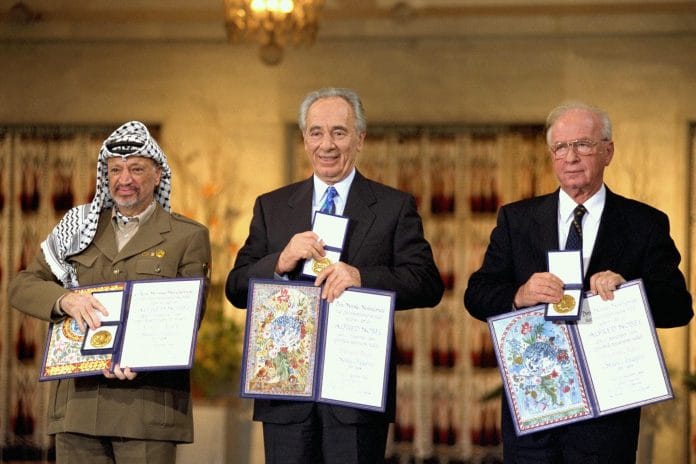In his book ‘No Room For Small Dreams’, former Israeli president Shimon Peres takes us through the tumultuous birth of Israel and its growing up years.
Shimon Peres, Israeli statesman who passed away little more than a year ago after a long and illustrious career, was a man of many talents, a passionate patriot, an author and renowned leader of his country, who at different times occupied some of the highest offices of Israel. His life closely mirrored that of the country he served with such devotion, in its progress from the hard scrabble existence of the early years to the prosperity and material success it enjoys today. In Shimon Peres’s lifetime his country advanced from a vulnerable and insecure entity to the potent and formidable country of today, which militarily outclasses its neighbours but has nevertheless not shed its endemic sense of vulnerability, hence remains always on edge. The evolution of Israel and its emergence as a well-established nation is the broader theme of Shimon Peres’s book. His tale begins in a Polish ghetto where his family lived under the baleful shadow of Hitler’s Germany, looking for ways of finding a new life safe from the perils of the Holocaust, during which many millions perished but the Peres family was among those that were able to survive and find means to emigrate to what would become the land of Israel. As emigrants to a new land they commenced the backbreaking labour of rebuilding their habitations and settling into a new life in inhospitable circumstances. It is a compelling story that illuminates much about Israel’s development and progress, and, indeed, about the resilience of the human spirit.
But it is not a simple story. In Shimon Peres’s telling Israel is a combative nation that felt compelled to take up arms in the fight for its existence. It was, and remains, a highly militarized community that has expanded its domain through occupation of its neighbours’ lands, so while it merits sympathy for its historic tribulations, the way it has expanded and consolidated the territory it controls has led to the displacement of large numbers of the original inhabitants who are no less deserving of support and consideration. As events over the last half-century have repeatedly shown, there are no easy answers to the problems of the Middle East and Shimon Peres does not suggest anything to the contrary. From the start he was an uncompromising warrior for the cause that had nurtured him and as long as he lived the struggle for Israel never came to an end.
The towering figure that guided Israel’s people to a new destiny was David Ben-Gurion, who saw important talents in Shimon Peres and groomed him as a protégé who had much to offer the nascent nation. At different stages of his life, Shimon Peres undertook diverse tasks on behalf of his government, some of which represented fresh challenges that are described in the present narrative which is in effect his swansong, for he did not live long after the book found its way into print. By then, he had been for many years one of the key figures in Israel’s polity and architect of some of its most distinctive policies, including its special relationship with USA. In its own time, another relationship with one of the great powers of the time, France, was no less valuable an asset for Israel. Assistance from France had crucial results in the development of Israel’s nuclear deterrent which has never been formally acknowledged but, as described here, is the centerpiece of Israel’s military defence posture. Nuclear technology was acquired from France through a successful operation in which Shimon Peres had a major role; Israel was , enabled to obtain what it coveted while the great powers of the day came together against it in disapproval and discouragement. The reactor at Dimona where Israel’s nuclear programme is based was established at that time, with Israel being able to make light of the many nuclear embargoes imposed on it, its security imperatives being such as to trump all other considerations.
It hardly needs to be reiterated that Israel from the start was embroiled in war. The European imperialists did not depart from the Middle East without leaving a bitter legacy that bred further turmoil and strife. Shimon Peres describes some aspects of the Suez crisis of 1956 that revived regional conflict and came near to provoking general war between the Super Powers, with Israel at the centre of events in collaboration with Britain and France. It was a tense and dangerous moment for the peace of the world.
Another dramatic episode of the Peres era was the hijacking attempt involving a number of Israeli hostages who were seized and taken to Entebbe in Uganda where their lives were in grave danger at the hands of a trigger-happy gang of soldiers. This was the time of the Ugandan dictator Idi Amin whose actions were impossible to predict, the irrationality of his responses adding further danger to an already fraught and hazardous situation. Shimon Peres provides an engrossing account of how the crisis unfolded, how the physical and psychological challenges were met, and eventually how the few shards of available information were assembled into a plan for action that left Idi Amin helpless while a daring Israeli raid devastated Entebbe and secured the release of the hostages. Nothing quite like it had ever been attempted before, and there were several previous examples to show how risky the operation could become, so it was an amazing achievement to pull it off. Unhappily, the Entebbe raid did not represent the turning of the tide in the war against terrorism, and the criminals were not daunted for too long before they returned to their ways, and since then the fear of terrorism as a global phenomenon has grown further.
While these events were taking place, Shimon Peres steadily assumed greater state responsibilities in his country. He became a member of the cabinet with an important voice in public affairs. He ascended to the office of president, at the apex of the state hierarchy, where he earned high respect at home and abroad. It was the climax of a journey that had begun in a Warsaw ghetto.
It was not the end of Shimon Peres’s journey however; at a time when he might have been expected to seek the rewards and benefits of retirement, laden with honours, Shimon Peres produced his most striking coup as a visionary and a statesman. All his life he had been identified with unyielding struggle and hardline endeavour but at the end of the struggle he had a change of heart and began to move his people towards reconciliation with the historic foe, looking for a peaceful outcome to the problem rather than a solution imposed through overwhelming force. The considerations that led to this change of strategy are described in some detail, which is only appropriate for this was a momentous and unanticipated shift that came as a complete surprise to the general public in both Israel and the Arab world.
While the Middle East was convulsed by these developments, elsewhere too the peace moves promoted by Shimon Peres received a very warm welcome. It required careful and delicate diplomacy to put the different parts together and permit the Arab-Israel deal to be concluded. It was the final test for Peres, which he passed with flying colours. He remarked at one point that in such a negotiation one’s own team was sometimes more difficult to manage than the other side. Israel’s Prime Minister at the time was the hawkish Yitzhak Rabin, like Shimon Peres a late convert to the unalterable necessity of finding a route to peace, and like him the recipient of much personal abuse as news of the agreement began to trickle out. Nothing deterred, Shimon Peres persisted with his efforts, had a crucial role in bringing Rabin around, and eventually gave currency to a solution that found room for both sides – the two nation solution as it is called something on which both sides can agree and which continues to command support from many who are in quest of peace.
Unhappily, this particular development, in which Shimon Peres played such a critical part to persuade his own colleagues and to build bridges with Arab leaders, especially President Sadat of Egypt, was not destined to end as its architects had wished. In a gesture of support by the world community the Nobel peace prize had been jointly conferred on the two leaders but both succumbed to the assassin’s hand. It was a devastating finale to a brave and promising endeavour.
Since then the contours of the issue have changed. New leaders have come to power without the commitment shown by Shimon Peres and his counterparts. Incidents on the ground have multiplied, making it harder than ever to search for peace. The Middle East remains fraught and dangerous. It is good, nevertheless, to have this account by Shimon Peres of a sincere attempt to find a solution, describing an initiative that came close to success. The present moment may not be appropriate for a renewed attempt but sharing this account of the peace talks may in time inspire further such attempts.
Salman Haidar is former Foreign Secretary of India. ‘No Room for Small Dreams by Shimon Peres’ has been published by Weidenfeld & Nicolson.







